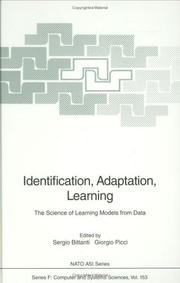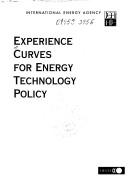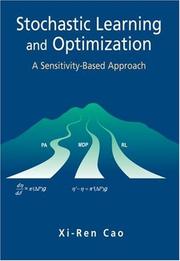| Listing 1 - 4 of 4 |
Sort by
|
Periodical
ISSN: 19883145
Abstract | Keywords | Export | Availability | Bookmark
 Loading...
Loading...Choose an application
- Reference Manager
- EndNote
- RefWorks (Direct export to RefWorks)
mathematical modeling --- modelling tasks --- modelling cycle --- Science --- Learning models (Stochastic processes) --- Study and teaching --- Study and teaching. --- Mathematical learning models (Stochastic processes) --- Models, Learning (Stochastic processes) --- Stochastic learning models (Stochastic processes) --- Learning --- Sequential analysis --- Stochastic processes --- Science education --- Scientific education --- Mathematical models

ISBN: 3540610804 9783540610809 Year: 1996 Volume: vol. 153. Publisher: Berlin Springer
Abstract | Keywords | Export | Availability | Bookmark
 Loading...
Loading...Choose an application
- Reference Manager
- EndNote
- RefWorks (Direct export to RefWorks)
System identification --- Linear models (Statistics) --- Learning models (Stochastic processes) --- Systèmes, Identification des --- Modèles linéaires (statistique) --- Modèles stochastiques d'apprentissage --- Congresses. --- Congrès --- #TELE:SISTA --- Systèmes, Identification des --- Modèles linéaires (statistique) --- Modèles stochastiques d'apprentissage --- Congrès --- Models, Linear (Statistics) --- Mathematical models --- Mathematical statistics --- Statistics --- Mathematical learning models (Stochastic processes) --- Models, Learning (Stochastic processes) --- Stochastic learning models (Stochastic processes) --- Learning --- Sequential analysis --- Stochastic processes --- Congresses

ISBN: 1280035420 9786610035427 9264182160 9264176500 Year: 2000 Publisher: Paris : OECD Publishing,
Abstract | Keywords | Export | Availability | Bookmark
 Loading...
Loading...Choose an application
- Reference Manager
- EndNote
- RefWorks (Direct export to RefWorks)
The fact that market experience improves performance and reduces prices is well known and widely exploited in technology-intensive industries, but sparsely used in analysis for energy technology policy. Knowledge of the “experience effect” can help in the design of efficient programmes for deploying of environment-friendly technologies. The effect must be taken into account when estimating the future costs of achieving targets, including targets for carbon dioxide reduction. This book discusses issues raised by the “experience effect”, such as price-cost cycles, competition for learning opportunities in the market, risk of “technology lockout” and the effects of research, development and deployment policies on technology learning. Case studies illustrate how experience curves can be used to set policy targets and to design policy measures that will encourage both investment in and use of environment-friendly energy technologies. Low-cost paths to stabilising CO2 emissions are explored.
Energy policy -- Planning. --- Experiential learning. --- Learning models (Stochastic processes). --- Energy policy --- Learning models (Stochastic processes) --- Experiential learning --- Business & Economics --- Industries --- Planning --- Experience-based learning --- Learning, Experiential --- Mathematical learning models (Stochastic processes) --- Models, Learning (Stochastic processes) --- Stochastic learning models (Stochastic processes) --- Energy and state --- Power resources --- State and energy --- Government policy --- Experience --- Learning --- Active learning --- Sequential analysis --- Stochastic processes --- Industrial policy --- Energy conservation --- Mathematical models --- Planning. --- Politique énergétique --- Modèles stochastiques d'apprentissage --- Apprentissage expérentiel --- Planification

ISBN: 1281116866 9786611116866 0387690824 038736787X 144194222X Year: 2007 Publisher: New York : Springer,
Abstract | Keywords | Export | Availability | Bookmark
 Loading...
Loading...Choose an application
- Reference Manager
- EndNote
- RefWorks (Direct export to RefWorks)
Stochastic learning and optimization is a multidisciplinary subject that has wide applications in modern engineering, social, and financial problems, including those in Internet and wireless communications, manufacturing, robotics, logistics, biomedical systems, and investment science. This book is unique in the following aspects. (Four areas in one book) This book covers various disciplines in learning and optimization, including perturbation analysis (PA) of discrete-event dynamic systems, Markov decision processes (MDP)s), reinforcement learning (RL), and adaptive control, within a unified framework. (A simple approach to MDPs) This book introduces MDP theory through a simple approach based on performance difference formulas. This approach leads to results for the n-bias optimality with long-run average-cost criteria and Blackwell's optimality without discounting. (Event-based optimization) This book introduces the recently developed event-based optimization approach, which opens up a research direction in overcoming or alleviating the difficulties due to the curse of dimensionality issue by utilizing the system's special features. (Sample-path construction) This book emphasizes physical interpretations based on the sample-path construction.
Learning models (Stochastic processes) --- Mathematical optimization. --- Optimization (Mathematics) --- Optimization techniques --- Optimization theory --- Systems optimization --- Mathematical analysis --- Maxima and minima --- Operations research --- Simulation methods --- System analysis --- Mathematical learning models (Stochastic processes) --- Models, Learning (Stochastic processes) --- Stochastic learning models (Stochastic processes) --- Learning --- Sequential analysis --- Stochastic processes --- Mathematical models --- Computational complexity. --- Engineering design. --- Artificial intelligence. --- Distribution (Probability theory. --- Discrete Mathematics in Computer Science. --- Engineering Design. --- Control and Systems Theory. --- Artificial Intelligence. --- Calculus of Variations and Optimal Control; Optimization. --- Probability Theory and Stochastic Processes. --- Distribution functions --- Frequency distribution --- Characteristic functions --- Probabilities --- AI (Artificial intelligence) --- Artificial thinking --- Electronic brains --- Intellectronics --- Intelligence, Artificial --- Intelligent machines --- Machine intelligence --- Thinking, Artificial --- Bionics --- Cognitive science --- Digital computer simulation --- Electronic data processing --- Logic machines --- Machine theory --- Self-organizing systems --- Fifth generation computers --- Neural computers --- Design, Engineering --- Engineering --- Industrial design --- Strains and stresses --- Complexity, Computational --- Design --- Computer science—Mathematics. --- Control engineering. --- Calculus of variations. --- Probabilities. --- Probability --- Statistical inference --- Combinations --- Mathematics --- Chance --- Least squares --- Mathematical statistics --- Risk --- Isoperimetrical problems --- Variations, Calculus of --- Control engineering --- Control equipment --- Control theory --- Engineering instruments --- Automation --- Programmable controllers
| Listing 1 - 4 of 4 |
Sort by
|

 Search
Search Feedback
Feedback About UniCat
About UniCat  Help
Help News
News